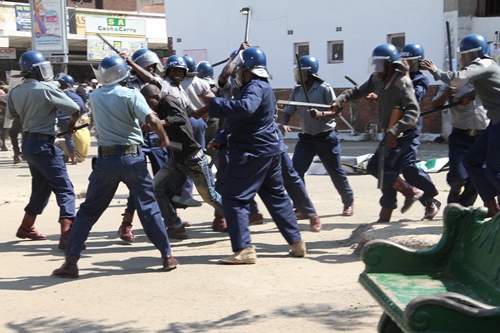HARARE – Zimbabwe’s human rights violations and poor democracy were under the spotlight this week when civil society from three African countries met in Manzini, Swaziland, at the Sadc 2016 People’s Summit Commission on Democracy, Good Governance and Human Rights.
Zimbabwe Human Rights Association (ZimRights) in collaboration with civil society from Lesotho and Swaziland organised the human rights session where they decried the state of affairs in three spotlight countries — Zimbabwe, Lesotho and Swaziland, in the Sadc region.
ZimRights and other organisations from Zimbabwe were pushing for recognition and need for solutions to the Zimbabwean crisis after a winter of protests over socio-economic justice, which the authorities answered to with police brutality and further human rights abuses.
In particular, ZimRights hosted a discussion on the question of social media, cyber activism and citizen mobilisation for social justice that closely looked at the recent social upheavals back home.
Yesterday (Friday) the delegates were expected to march at Bosco Hall in Manzini, with the final communiqué to be handed in to the Sadc Heads of State and Government. Issues raised will also be brought to the attention of the 36th Sadc Head of States and Government Summit.
Speaking at the meeting on Thursday, ZimRights director Okay Machisa said there isn’t any good governance to talk about when it comes to Sadc countries.
“When you start to ask the government to do well they do harm to you. They answer you with dogs, beatings, arrests, abductions and killings.
“In my country, we have a government that has resorted to brutalising its own people. One of our pastors started what he called #Thisflag campaign, and one of these days the president stood up to castigate the church leader,” said Machisa. The Zimrights director however, congratulated the country’s war veterans of the liberation struggle saying they have now seen the light.
“They have seen that they were supporting a system that was eating them. Congratulations to the war veterans who are pro-democracy now. We are talking about fundamental freedoms that have been curtailed in our countries including in Swaziland.”
Machisa urged Swaziland’s King Mswati III who is the impending chairmanship of Sadc to leave a good legacy by making sure his country comes up with a Constitution that will allow for proper elections.
“We are faced with a time when Sadc is going to be led by Mswati and we all know the challenges that are associated with his government.
“I pray the King will understand that on day the people shall come up with their own constitution that will allow proper elections in Swaziland. I pray that he will realise that one day as a leader of Sadc he has to leave a good legacy,” said Machisa.
Afro Jazz singer Kuchinei Chatsama also commented Zimbabwe and other Sadc countries should observe human rights and democracy for the region’s socio-economy environment, standards of living and elections at any level to be deemed credible.
“A country that respects rule of law and human rights is not only deemed as a safe investment destination but is projective. Zimbabwe has been lacking in that regard and there is an urgent need to address this shortcoming to attract foreign direct investments, impove freedom of the press rankings as wel as arts, poetry and music,” said Chatsama.
As if to cement the fears over his Sadc chairmanship, the authorities in Swaziland reportedly banned the traditional march of the social justice activists that usually signals the end of every edition of the Sadc People’s Summit, amid local media revelations of heavy police spying of the venue.
Lesotho is currently in the throes of a crisis and precarious security situation with the recommendations of a Sadc Commission of Inquiry into the assassination of former Lesotho army head Brigadier-General Maaparankoe Mahao not implemented.
The developments further cement Sadc’s “toothless bulldog” label. The widow of the slain army general, and six wives of soldiers detained for over a year on allegations of mutiny, came to the Sadc People’s Summit, where they pleaded for the regional bloc to deliver justice in the country.
A speaker from the Lesotho Council of non-governmental organisations said: “At every Sadc Summit there has to be an issue about Lesotho because of the way it is governed. “As we speak all the leaders of the main opposition parties are in exile in South Africa.”
Turning to the Sadc heads of State and government who will be hosted by King Mswati III in the few days to come, he said cynically: “They all agreed to come and watch the reed dance because they all want to be in the place that he is in. But they know the people will not allow it.”




